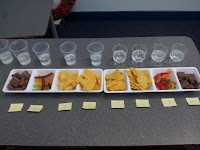Since posting the 'No more Homework' post yesterday I have had quite a mixed reaction from people. Seems having a title like that gets more people looking at your Blog, tripled the usual 'traffic', but that was never my goal. This is something that I feel quite strongly about, and an idea I plan on exploring further.
I received some mixed reactions, with some really positive and supportive comments from people and offering their points of view. I quite enjoy hearing other viewpoints that support and challenge my own ideas. Life is a learning process and every single day I'm learning new things in education and become exposed to different theories. I read this interesting extract from Alfie Kohn, education author and speaker, regarding homework.
The Case Against Homework
By Alfie Kohn
After spending all day in school, our children are forced to begin a second shift, with more academic assignments to be completed at home. This arrangement is rather odd when you stop to think about it, as is the fact that few of us ever do stop to think about it.
Instead of assuming that homework should be a given, or that it allegedly benefits children, I've spent the last few years reviewing the available research and talking to parents, teachers and students. My findings can be summarized in seven words: Homework is all pain and no gain.
The pain is obvious to kids but isn't always taken seriously by adults. Backpacks stuffed with assignments leave students exhausted, frustrated, less interested in intellectual pursuits and lacking time to do things they enjoy. "Most of what homework is doing," says literacy expert Harvey Daniels, "is driving kids away from learning."
We parents, meanwhile, turn into nags. After being away from our children all day, the first words out of our mouths, sadly, may be: "So, did you finish your homework?" One mother told me it permanently damaged her relationship with her son because it forced her to be an enforcer rather than a mom.
The surprising news, though, is that there are virtually no pros to balance the cons. Even if you regard grades or test scores as good measures of learning, which I do not, doing homework has no statistical relationship to achievement in elementary school. In high school, some studies do find a correlation between homework and test scores, but it's usually fairly small. And in any case, it's far from clear that the former causes the latter. And if you're wondering, not a single study has ever supported the folk wisdom that homework teaches good work habits or develops positive character traits such as self-discipline, responsibility or independence.
Some teachers know all this but feel compelled to keep assigning homework for tradition's sake, or because of pressure from administrators or, ironically, parents. Adults also may assume that kids will waste their time (read: do things grown-ups don't regard as sufficiently constructive) unless they're made to do schoolwork at home.
Still others believe—incorrectly—that more time spent on a task produces better results, or that because practice is required to be a good athlete or musician, it's also at the heart of intellectual growth. It isn't. You can't "reinforce" understanding the way you can reinforce a behavior. In my experience, people with the least sophisticated understanding of how children learn, or the least amount of concern about children's attitudes toward learning, tend to be the most enthusiastic supporters of homework.
We might forgive the infringement on family time if homework were assigned only when there was good reason to think that this particular task would benefit these particular students, that it will help them think more deeply about questions that matter and create more excitement about learning (and that it can't be done at school). But what educators are more likely to say is, in effect, "Your children will have to do something every night. Later on we'll figure out what to make them do." If there's a persuasive defense of that approach, I've never heard it.
Not only should there be much less homework assigned, there ought to be none at all of the worst types, such as filling out worksheets or cramming forgettable facts into short-term memory. I believe "no homework" should be the default arrangement. In other words, weeknight (let alone weekend or vacation) assignments should have to be justified on a case-by-case basis. Because most homework can't be justified, some teachers, and even some whole schools, have stopped assigning it altogether, with fabulous results.
We parents need to reach out to others in our communities to debunk uninformed assumptions ("homework is academically beneficial"), to challenge silly claims ("homework is needed to provide a link between school and family"), and to help restore sanity and joy to our children's lives. We should respectfully but pointedly inform educators that the status quo isn't supported by good research or basic values, and those values include a commitment to let kids be kids and provide them with time to grow socially, physically, emotionally and artistically—not just academically.
(The Homework Myth (Da Capo Press) Alfie Kohn)










